Movie Review: Fury (2014) Starring Brad Pitt, Shia LaBeouf, Logan Lerman, Michael Pena, and Jon Bernthal. Written and directed by David Ayer.
“War is cruelty and you cannot refine it.”—William Tecumseh Sherman
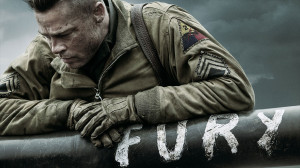 The World War II movie has been around as long as the war itself. Hollywood began churning out anti-Nazi flicks even before combat began in Europe in 1939, and from the moment Japanese bombs fell on Pearl Harbor Tinseltown was all in. Some of its best efforts, like Casablanca, weren’t even about war, but about how the conflict disrupted lives and displaced lovers.
The World War II movie has been around as long as the war itself. Hollywood began churning out anti-Nazi flicks even before combat began in Europe in 1939, and from the moment Japanese bombs fell on Pearl Harbor Tinseltown was all in. Some of its best efforts, like Casablanca, weren’t even about war, but about how the conflict disrupted lives and displaced lovers.
We could review some of the films that came out during the war (and some of them were quite good), but one movie released 53 years after the war’s end changed everything. Steven Spielberg’s Saving Private Ryan in 1998 took combat on film to a level and an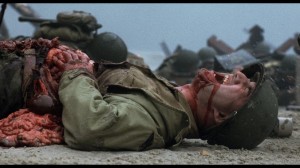 intensity never seen before, and no movie made after it can hope to pretend to anything other than farce if it doesn’t measure up.
intensity never seen before, and no movie made after it can hope to pretend to anything other than farce if it doesn’t measure up.
To be sure, other films before that—particularly Oliver Stone’s Platoon (1986), Spielberg’s Schindler’s List (1993) and Michael Mann’s 1992 version of Last of the Mohicans—brought a sense of realism to the violence and trauma of war that hadn’t been present before. But the opening twenty minutes of Private Ryan, which recreated the D-Day landings of June 6, 1944, were harrowing and graphic in a way that left audiences riveted and many veterans traumatized. I saw it six times in the theater and many times since on DVD and its impact remains unchanged.
Now comes David Ayer’s Fury, released October 17. The story of a American tank crew in the last days of the War, the movie stars Brad Pitt and a nice ensemble cast, and it follows the genre in all its clichés perfectly.
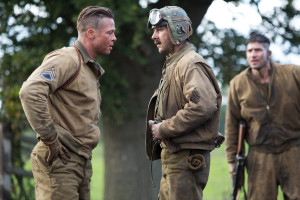 The World War II buddy movie has a time-worn formula that movie makers are loathe to give up. You’ve seen it many times. The squad is made up of a motley and diverse cast of characters who all make jokes at each other’s expense but who of course love each other and are bonded by combat. There is always a wisecracking New Yorker with a Brooklyn accent; a Midwesterner, usually nicknamed “Iowa” or “Nebraska”; a Southerner, often a sharpshooter (think Sergeant York), who dryly quotes scripture almost every time he’s on screen and putting a bullet in somebody’s head. He is invariably nicknamed something like “Hillbilly” or “Tex”; a hard-boiled, brooding leader with a mysterious background who ends up usually hailing from either Pennsylvania or the Midwest and turns out to be either a mailman or a baseball coach before the war; and finally, one member who passes for a minority, either a Jew or a Hispanic.
The World War II buddy movie has a time-worn formula that movie makers are loathe to give up. You’ve seen it many times. The squad is made up of a motley and diverse cast of characters who all make jokes at each other’s expense but who of course love each other and are bonded by combat. There is always a wisecracking New Yorker with a Brooklyn accent; a Midwesterner, usually nicknamed “Iowa” or “Nebraska”; a Southerner, often a sharpshooter (think Sergeant York), who dryly quotes scripture almost every time he’s on screen and putting a bullet in somebody’s head. He is invariably nicknamed something like “Hillbilly” or “Tex”; a hard-boiled, brooding leader with a mysterious background who ends up usually hailing from either Pennsylvania or the Midwest and turns out to be either a mailman or a baseball coach before the war; and finally, one member who passes for a minority, either a Jew or a Hispanic.
Very early in the film one standing member of the group will get killed and will inevitably be replaced by a green-as-a-Granny-Smith-apple 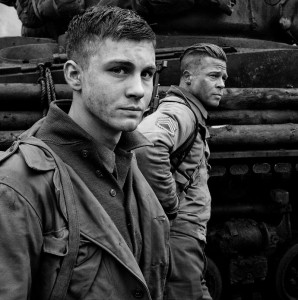 rookie who a) has never seen combat), b) is usually anti-violence and loathe to kill, no matter the circumstances and c) becomes the squad egghead and/or resident sissy who quotes poetry or will be seen reading a book of some kind during a lull in combat. This fellow’s manhood will be questioned, will be found wanting, will be put to the ultimate test, and he will, in the end, be the only one standing.
rookie who a) has never seen combat), b) is usually anti-violence and loathe to kill, no matter the circumstances and c) becomes the squad egghead and/or resident sissy who quotes poetry or will be seen reading a book of some kind during a lull in combat. This fellow’s manhood will be questioned, will be found wanting, will be put to the ultimate test, and he will, in the end, be the only one standing.
Also part of the formula: the squad will fight for most of the picture as part of a larger unit but near the end of the flick they’ll find themselves cut off from everyone else and forced to make a hard choice: run and try to re-join the larger group or stand and fight and face near-total annihilation while serving the larger cause. Guess which one they choose?
Saving Private Ryan, for all its combat realism, followed this formula right down to the last 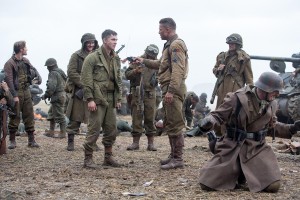 moment, and Fury does too. Unlike Spielberg’s film, however, Ayer’s offering is no love letter to the generation that fought the Big One. This is all about Sherman’s quote that began this blog—war is hell, and you cannot refine it. The movie opens with violence and follows it through right to the end, and you’re not always sure what the larger story arc is, other than survival. And that’s precisely the point. By April 1945, when this movie takes place, most combat veterans just wanted to make it to the end; whatever larger, overarching theme there is in this movie is juxtaposed with the soldier’s will and desperation to survive—another minute, another hour, another day, to make it to war’s end, and then back home again.
moment, and Fury does too. Unlike Spielberg’s film, however, Ayer’s offering is no love letter to the generation that fought the Big One. This is all about Sherman’s quote that began this blog—war is hell, and you cannot refine it. The movie opens with violence and follows it through right to the end, and you’re not always sure what the larger story arc is, other than survival. And that’s precisely the point. By April 1945, when this movie takes place, most combat veterans just wanted to make it to the end; whatever larger, overarching theme there is in this movie is juxtaposed with the soldier’s will and desperation to survive—another minute, another hour, another day, to make it to war’s end, and then back home again.
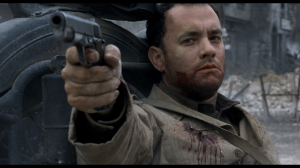 There are of course things wrong with this movie, starting with the fact that there were no 50-year-old tank commanders in World War II. None. Nada. Zilch. If you were 50 years old and in the U.S. Army, you were a general. You were nothing else. Even Tom Hanks was beyond the age, at 42, of a captain in Private Ryan. Grizzled and weary WWII combat soldiers were 28.
There are of course things wrong with this movie, starting with the fact that there were no 50-year-old tank commanders in World War II. None. Nada. Zilch. If you were 50 years old and in the U.S. Army, you were a general. You were nothing else. Even Tom Hanks was beyond the age, at 42, of a captain in Private Ryan. Grizzled and weary WWII combat soldiers were 28.
To Brad Pitt’s credit—and this soon-to-be-50-year-old is eternally grateful—he makes you forget he’s 50. He’s as plausible in this role as he’s ever been in anything he’s done in his long career, and in this instance his pretty-boy looks and youthfulness serve him well. Those same attributes often make you overlook the fact that he’s a fine actor, but this time he makes the most of them without making that the reason you cheer for him.
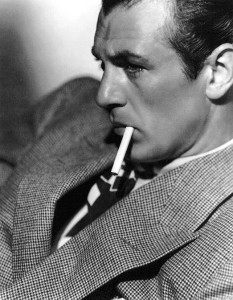 To my mind, this role is a turning point in Pitt’s career. He is as close now to what passes in Hollywood for a Gary Cooper or a Clark Gable—the man who, when he is on the screen, commands your attention without even opening his mouth. Pitt does that numerous times in this movie, sometimes quite literally taking command of a situation that threatens to explode right in front of you, and he never even moves. If George Clooney is our modern-day Cary Grant, and Tom Hanks is Jimmy Stewart, Pitt is Coop, The King, Errol Flynn, and in some ways Henry Fonda all rolled into one—a character with an earnest but quiet dignity that evokes the best moments of those stars from Hollywood’s golden era.
To my mind, this role is a turning point in Pitt’s career. He is as close now to what passes in Hollywood for a Gary Cooper or a Clark Gable—the man who, when he is on the screen, commands your attention without even opening his mouth. Pitt does that numerous times in this movie, sometimes quite literally taking command of a situation that threatens to explode right in front of you, and he never even moves. If George Clooney is our modern-day Cary Grant, and Tom Hanks is Jimmy Stewart, Pitt is Coop, The King, Errol Flynn, and in some ways Henry Fonda all rolled into one—a character with an earnest but quiet dignity that evokes the best moments of those stars from Hollywood’s golden era.
One thing this movie does well is muddy the waters of the narrative of the American G.I. Whatever else Stephen Ambrose would have us believe about the American soldier as liberator, there are moments in this film when one wonders how excited the German civilians were to see the Americans roll into town. War obliterates all rules, and even the most civilized people can be brutalized and desensitized by unrelenting violence. Fury demonstrates this well. Ayer’s G.I.s are not the sort of people you’d meet at an ice-cream social, and Americans or no, there’s no mistaking the reality that Western Civilization itself was a casualty of this war.
Another point that is well made in this film: American military personnel did not take any German S.S. as prisoners. Members of the S.S. were trained killers, and they were treated as such, a point made repeatedly in all the recent movies and mini-series. Watch for it here too.
Is this the best WWII t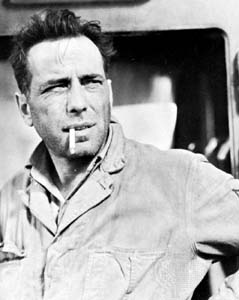 ank movie ever made? Nope. Since this is a blog about history, my money is still on Humphrey Bogart’s 1943 classic, Sahara, which employed all the buddy war-movie clichés but with a United Nations cast, and with Bogart’s ultra-cool, towering performance that still stands over 70 years later. Every generation needs to interpret World War II for itself and let its stars stand in for those of yester-year, whether it was Bogart, George C. Scott as Patton, Clint Eastwood in the Vietnam-era Kelly’s Heroes, Tom Hanks, and now Brad Pitt.
ank movie ever made? Nope. Since this is a blog about history, my money is still on Humphrey Bogart’s 1943 classic, Sahara, which employed all the buddy war-movie clichés but with a United Nations cast, and with Bogart’s ultra-cool, towering performance that still stands over 70 years later. Every generation needs to interpret World War II for itself and let its stars stand in for those of yester-year, whether it was Bogart, George C. Scott as Patton, Clint Eastwood in the Vietnam-era Kelly’s Heroes, Tom Hanks, and now Brad Pitt.
In the end, what we’re left with is the sense that the war was big, messy, and traumatizing for all those who fought in it. Those who survived were damaged too, in different ways. It’s hard to come away from this film—or any other good one about war—and not be convinced that however necessary it might sometimes be, it always destroys more than it preserves.
This movie too, like its predecessors, reminds us—and we always need reminding—that, as Bruce Catton so eloquently put it, when the Great Challenge comes, the most ordinary among us will rise up and do great things. But the cost will always be high. As the World War II generation literally disappears from our sight, we’re haunted by the question of what all those young men left lying on WWII battlefields—and indeed from all wars—might have achieved if they had been allowed to return to a world without war.
